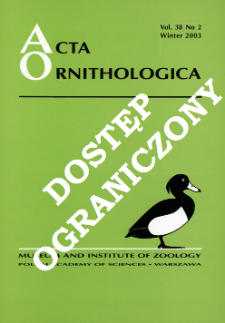- Search in all Repository
- Literature and maps
- Archeology
- Mills database
- Natural sciences
Advanced search
Advanced search
Advanced search
Advanced search
Advanced search

Object
Title: The numbers and distribution of red-breasted geese Branta ruficollis at winter roosts in Romania and Bulgaria
Creator:
Dereliev, Sergej ; Hulea, Dan ; Ivanov, Bozhidar ; Sutherland, William J. ; Summers, Ron W.
Date issued/created:
Resource type:
Subtitle:
Acta Ornithologica, vol. 35, no. 1 ; Liczebność i rozmieszczenie bernikli rdzawoszyich na zimowiskach w Rumunii i Bułgarii ; Wintering of red-breasted geese
Contributor:
Polska Akademia Nauk. Muzeum i Instytut Zoologii ; Meeting of the European Ornithologists' Union (2 ; 1999 ; Gdańsk)
Publisher:
Muzeum i Instytut Zoologii PAN
Place of publishing:
Description:
Referat wygłoszony na Second Meeting of the European Ornithologists' Union ; Bibliogr. p. 65-66 ; P. [63]-66 : ill. ; 27 cm ; Abstract in Polish. Taxa in Latin
Type of object:
Abstract:
Red-breasted Geese breed in Siberia and the entire population migrate to western Black Sea coast, where it spend winter in Romania and Bulgaria. This goose is classified as globally threatened bird species, because of high winter concentrations at small areas and a lot of threats in the whole flyway. Red-breasted Geese were counted at their roost sites in Bulgaria and Romania between 1995 and 1999. They arrived in Romania in the second part of October, while in Bulgaria they started to arrive in the second part of November. The peak numbers (40 000-55 000) were usually recorded in Romania in November and December. Almost the whole population moved into Bulgaria during January-February when up to 62 600 were counted. Return migration started in February and by the end of March almost all had left the region.
Relation:
Volume:
Issue:
Start page:
End page:
Detailed Resource Type:
Format:
Resource Identifier:
Source:
MiIZ PAN, call no. P.257, Vol. 35, No 1 ; MiIZ PAN, call no. P.4568, Vol. 35, No 1 ; click here to follow the link
Language:
Rights:
Rights Reserved - Restricted Access
Terms of use:
Digitizing institution:
Museum and Institute of Zoology of the Polish Academy of Sciences
Original in:
Library of the Museum and Institute of Zoology of the Polish Academy of Sciences
Projects co-financed by:
Programme Innovative Economy, 2010-2014, Priority Axis 2. R&D infrastructure ; European Union. European Regional Development Fund
Access:
Object collections:
- Digital Repository of Scientific Institutes > Partners' collections > Museum and Institute of Zoology PAS > Scientific Journals
- Digital Repository of Scientific Institutes > Partners' collections > Museum and Institute of Zoology PAS > MIZ PAN Publications > Acta Ornithologica
- Digital Repository of Scientific Institutes > Literature > Journals/Articles
Last modified:
Feb 4, 2025
In our library since:
May 22, 2014
Number of object content downloads / hits:
82
All available object's versions:
https://rcin.org.pl./publication/61265
Show description in RDF format:
Show description in RDFa format:
Show description in OAI-PMH format:
Objects Similar
Lewartowski, Zenon Stawarczyk, Tadeusz (1952– ) Winiecki, Aleksander (1956– )
Gromadzki, Maciej (1940– ) Wieloch, Maria
Wieloch, Maria
Wieloch, Maria
Habitat choice of steller's eider Polysticta stelleri wintering at Lithuania coast of the Baltic Sea
Žydelis, Ramunas
Donchev, Stefan
Zubko, Valentina Havrilenko, Victor Semenov, Nikolay
Kazulìn, Alâksandr Vasìl'evìč

 INSTYTUT ARCHEOLOGII I ETNOLOGII POLSKIEJ AKADEMII NAUK
INSTYTUT ARCHEOLOGII I ETNOLOGII POLSKIEJ AKADEMII NAUK
 INSTYTUT BADAŃ LITERACKICH POLSKIEJ AKADEMII NAUK
INSTYTUT BADAŃ LITERACKICH POLSKIEJ AKADEMII NAUK
 INSTYTUT BADAWCZY LEŚNICTWA
INSTYTUT BADAWCZY LEŚNICTWA
 INSTYTUT BIOLOGII DOŚWIADCZALNEJ IM. MARCELEGO NENCKIEGO POLSKIEJ AKADEMII NAUK
INSTYTUT BIOLOGII DOŚWIADCZALNEJ IM. MARCELEGO NENCKIEGO POLSKIEJ AKADEMII NAUK
 INSTYTUT BIOLOGII SSAKÓW POLSKIEJ AKADEMII NAUK
INSTYTUT BIOLOGII SSAKÓW POLSKIEJ AKADEMII NAUK
 INSTYTUT CHEMII FIZYCZNEJ PAN
INSTYTUT CHEMII FIZYCZNEJ PAN
 INSTYTUT CHEMII ORGANICZNEJ PAN
INSTYTUT CHEMII ORGANICZNEJ PAN
 INSTYTUT FILOZOFII I SOCJOLOGII PAN
INSTYTUT FILOZOFII I SOCJOLOGII PAN
 INSTYTUT GEOGRAFII I PRZESTRZENNEGO ZAGOSPODAROWANIA PAN
INSTYTUT GEOGRAFII I PRZESTRZENNEGO ZAGOSPODAROWANIA PAN
 INSTYTUT HISTORII im. TADEUSZA MANTEUFFLA POLSKIEJ AKADEMII NAUK
INSTYTUT HISTORII im. TADEUSZA MANTEUFFLA POLSKIEJ AKADEMII NAUK
 INSTYTUT JĘZYKA POLSKIEGO POLSKIEJ AKADEMII NAUK
INSTYTUT JĘZYKA POLSKIEGO POLSKIEJ AKADEMII NAUK
 INSTYTUT MATEMATYCZNY PAN
INSTYTUT MATEMATYCZNY PAN
 INSTYTUT MEDYCYNY DOŚWIADCZALNEJ I KLINICZNEJ IM.MIROSŁAWA MOSSAKOWSKIEGO POLSKIEJ AKADEMII NAUK
INSTYTUT MEDYCYNY DOŚWIADCZALNEJ I KLINICZNEJ IM.MIROSŁAWA MOSSAKOWSKIEGO POLSKIEJ AKADEMII NAUK
 INSTYTUT PODSTAWOWYCH PROBLEMÓW TECHNIKI PAN
INSTYTUT PODSTAWOWYCH PROBLEMÓW TECHNIKI PAN
 INSTYTUT SLAWISTYKI PAN
INSTYTUT SLAWISTYKI PAN
 SIEĆ BADAWCZA ŁUKASIEWICZ - INSTYTUT TECHNOLOGII MATERIAŁÓW ELEKTRONICZNYCH
SIEĆ BADAWCZA ŁUKASIEWICZ - INSTYTUT TECHNOLOGII MATERIAŁÓW ELEKTRONICZNYCH
 MUZEUM I INSTYTUT ZOOLOGII POLSKIEJ AKADEMII NAUK
MUZEUM I INSTYTUT ZOOLOGII POLSKIEJ AKADEMII NAUK
 INSTYTUT BADAŃ SYSTEMOWYCH PAN
INSTYTUT BADAŃ SYSTEMOWYCH PAN
 INSTYTUT BOTANIKI IM. WŁADYSŁAWA SZAFERA POLSKIEJ AKADEMII NAUK
INSTYTUT BOTANIKI IM. WŁADYSŁAWA SZAFERA POLSKIEJ AKADEMII NAUK


































